Hi bud,
How’s 2025 going so far? The general consensus seems to be “not so good.” LA is still on fire, everybody I talk to seems to have a family member who has fallen ill, and I’ve already gotten a record breaking 4 traffic/parking tickets. I rang in the new year at the Northern Duchess Hospital, where my mom was housed in room 2025—a cruel cosmic joke.
The apt description “Destination 2025” played to my resolution for the coming year. As we move into this new era, I plan to cultivate “faith.” While I don’t anticipate a religious awakening, I do want to try living with more presence and purpose–a posture that I associate with religiosity. Ironically, it is this notion of faith without religion that leads me to today’s topic: angels.
My resolution was inspired, as ever, by German-Jewish philosopher and critic Walter Benjamin. Benjamin adored Talmudic angels who it was written would—in the span of an infinite instant–come into being, sing their song for god, and upon fulfilling that ultimate purpose, vanish into oblivion. As someone who has spent the better part of the present millennium seeking oblivion, I found this very moving.
Recently, I watched Danny Boyle’s 1997 follow-up to Trainspotting—A Life Less Ordinary. In the film, two angels (played by Holly Hunter and Delroy Lindo) are sent to earth to prove that Love still exists in the morally bankrupt 1990s. They do so by forcing a romance between a hapless kidnapper and his wily victim (Ewan MacGregor and Cameron Diaz, respectively). Roger Ebert gave the film two stars, describing it as a “movie that never convinces us that it needed to be made.” In it, Heaven is a whitewashed police station. This makes perfect sense because St. Peter and Santa are definitely cops. Hunter plays the horniest angel in cinematic history, Stanley Tucci the horniest dentist. Ewan MacGregor seems genuinely oblivious to his own hotness. And Diaz’s character slips uneasily from victim to mastermind to damsel-in-distress, all while wearing a really cute outfit with zebra print gloves and a matching bag:
The strangest thing about the film is that it fits neatly into a genre: irreverent angel movies. Obviously, there have been angel movies for a long time (and angel stories since year zero) but it’s not a coincidence that the most famous, It’s a Wonderful Life (1946), is a Christmas movie. Angels, corny, kitsch, and long relegated to the tops of Christmas trees, made a comeback in the 90s. The 1990s gave us Kevin Smith’s greatest film, Dogma (1999), and both Smith and Boyle owe a debt to Wim Wenders’ Wings of Desire (1987). Michael (1996), City of Angels (1998), Meet Joe Black (1998), and Little Nicky (2000) all fall under this label. Tony Kushner’s Angels in America (which premiered on Broadway in 1993), built on a longer lineage of angelic evocation within the gay community, drawing together the apocalyptic events of the AIDS epidemic, nuclear warfare (Allen Ginsberg refers to “angelic bombs” in Howl), and the hypocritical morality of the Reagan era. Wenders even made a follow-up to Wings of Desire called Faraway, So Close! (1993) that features a cameo by Mikhail Gorbachev. I probably should have watched it before writing this newsletter. These movies all grapple with big questions: the value of sensual experience and desire, and the search for morality and meaning in a modernity that has felt, at times, apocalyptic.
The decade’s New Agers combatted the Satanic Panic of the 1980s with the Christian-flavored hope ghosts that are Guardian Angels. In 1993, five of the ten bestselling books were about angels according to Publisher’s Weekly. Magazines like Time, Newsweek, and Ladies’ Home Journal all printed stories about angelic encounters and, in 1994, ABC aired a special, Angels: The Mysterious Messengers, hosted by Patty Duke: Angels (with Patty Duke) My very Gen-X mom’s very Gen-X friend still calls on her Guardian Angel when she can’t find parking in Fort Greene, the angel always provides.
Two reasons are oft given for the 90s Angel Craze: 1) angst around the millenarianism central to the Y2K hysteria and 2) the spiritual bankruptcy that accompanied the materialistic 1980s. Appropriately, the desire for spiritual connection quickly became another opportunity for consumerism with an explosion of angel-related books, figurines, etc. In 1994, Angel Records released Chant, a CD of Gregorian chant performed by the Benedictine monks of Santo Domingo de Silas in Spain that became a surprise hit, rising to no.3 on the Billboard 200 chart and going double platinum. The monks disrupted their religious duties to go on a press tour, doing appearances on The Tonight Show and Good Morning America (If you can find clips please share them with me, thx!).
The Angel of the 90s bears close resemblance to the toothless angels of the Victorian period, marking a shift in modernity’s conception of these magnificent beasts.
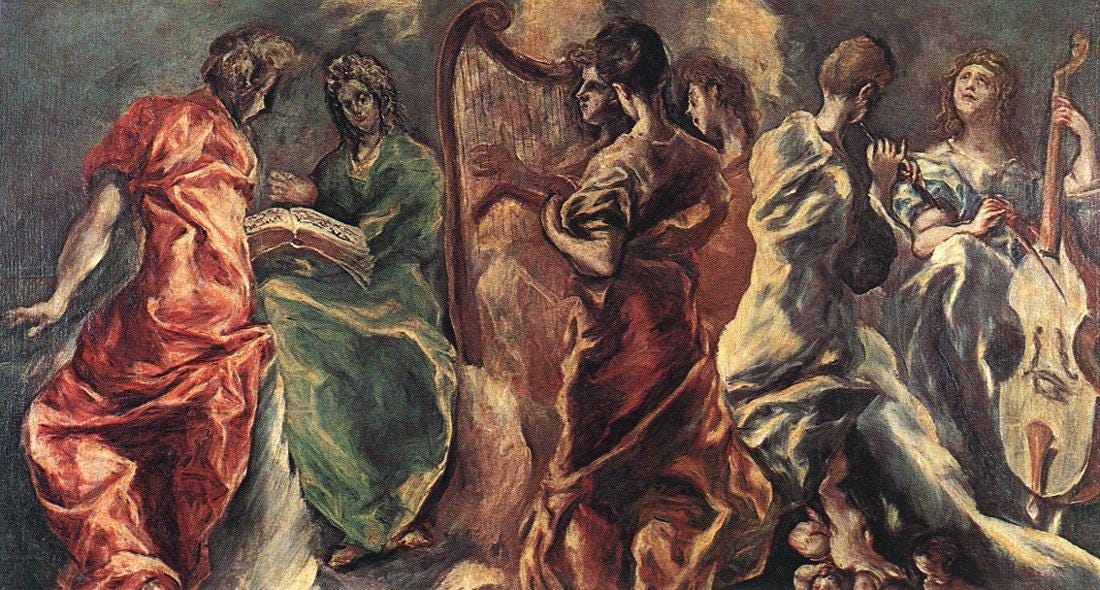
In his Duino Elegies, Rainer Maria Rilke famously writes “Every Angel is terrifying.” Written between 1912 and 1923, Rilke’s elegies are addressed to the angels that populate the Bible and Milton’s Paradise Lost rather than to the white-winged beauties that overtook the popular imagination in the era of Victorian sentimentalism. Victorian angels were chaste, embodied on earth by the “ministering angel,” an idealized vision of middle-class housewifery. In this fantasy, femininity dissolved into etheric trace–felt only in a loving gaze or the warm embrace of a well-kept sitting room. Milton’s angels model the irreverent embodied angels of 90s cinema, they eat, drink, and fuck: “Total they mix, union of pure with pure/ Desiring." These are the desiring spirits that terrify Rilke: “But if the archangel now, perilous, from behind the stars / took even one step down towards us: our own heart, beating / higher and higher, would beat us to death.” Rilke’s angels straddle the material and etheric realms, mediating between the limitations of experiencing the world and the excesses of its unbound reality. In the “First Elegy,” Rilke writes:
Ah, whom can we turn to
in our need? Not Angels, not humans,
and the sly animals see at once
how little at home we are
in the interpreted world.
Returning to my resolution, it’s the “interpreted world” that I seek refuge from this year. 2025 is about finding ourselves at home in the Open.
That said, I simply must plug the latest episode of 1-800-1800, which delves deep into the complicated legacy of Lewis and Clark’s 1805 expedition to find the Northwest passage. Lewis and Clark’s tale reminds us of the destructive capacities of interpretation, sating knowledge’s insatiable hunger. We also get drunk, stay silly and occasionally say something smart. Listen on Spotify or Apple.
toodle-oo,
Madeline





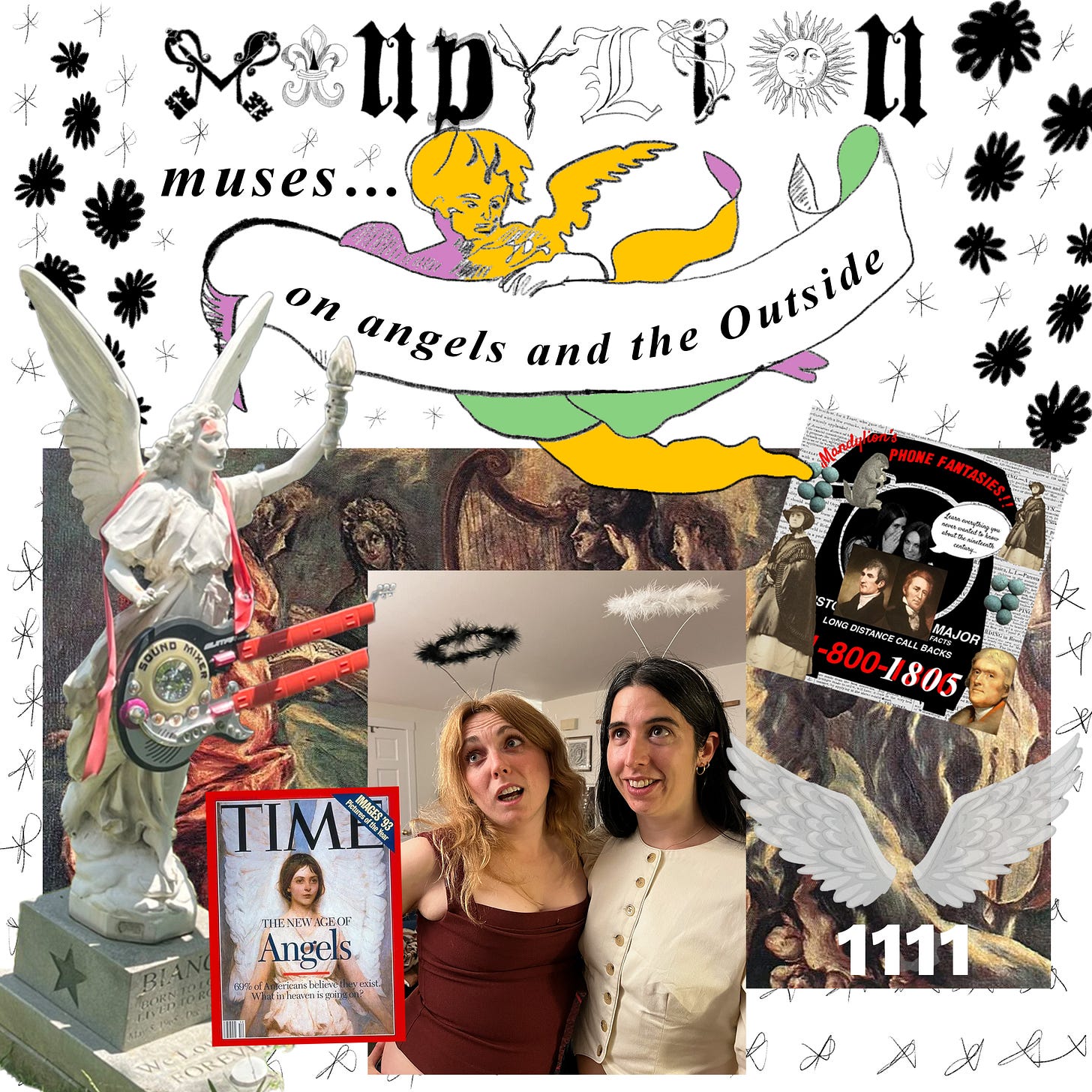
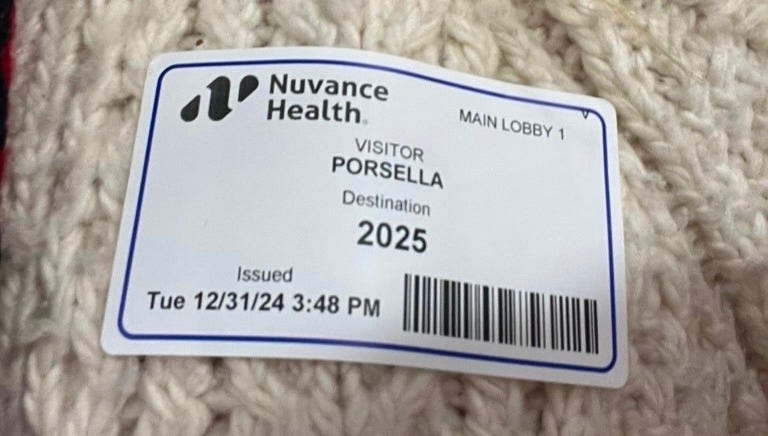

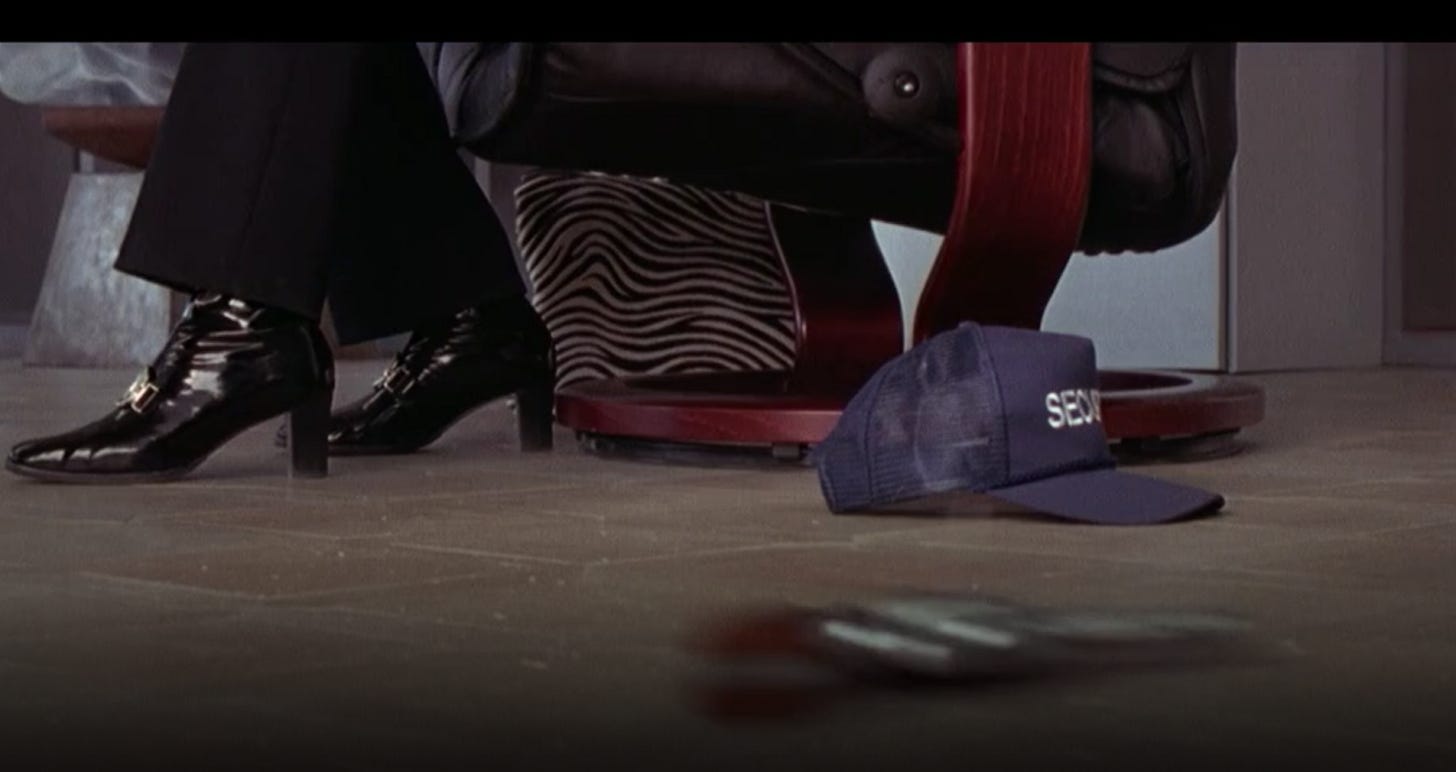


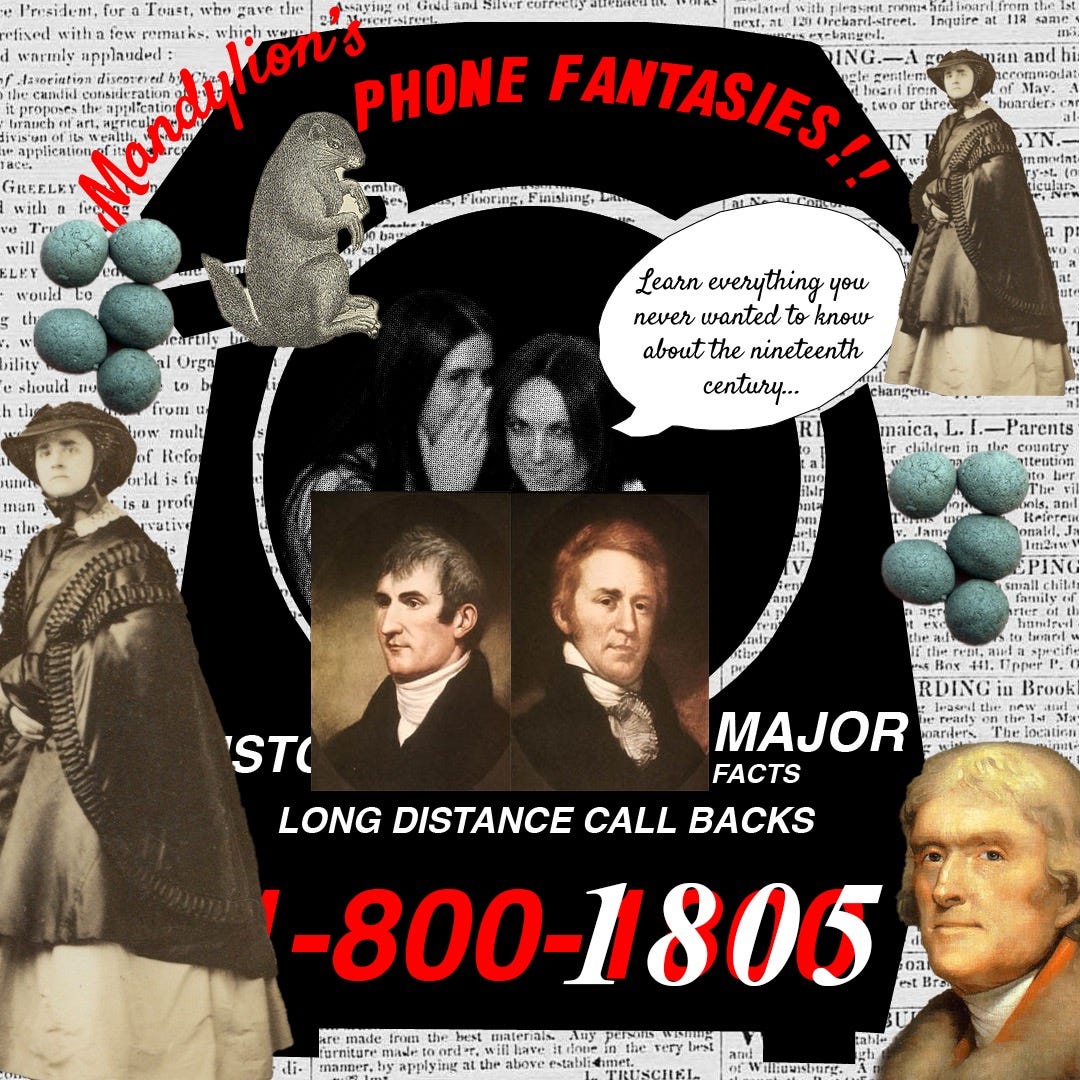
Don't forget the massively popular TV series Touched By an Angel.
I agree with the bit about living in the open , uninterpreted world. Way more fun out here